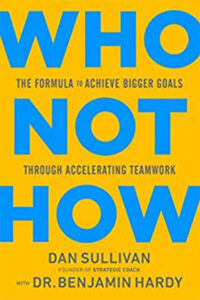With the 2022 recession, what will the lending market in 2023 look like? Are banks going to be more conservative? Is now a great time to be looking for opportunities? Should you start selling your business? Join Matt Fore as he talks with the owner of Vantage Point Mortgage, Paul Neal. Paul guides real estate investors and entrepreneurs to fund their futures through lending. Find out what the lending market will look like next year based on his crystal ball. And learn some advice on how you can build a better relationship with your lender.
—
Watch the episode here
Listen to the podcast here
Opportunities In The 2023 Lending Market With Paul Neal
In this episode, we have Paul Neal. Paul is the Founder of Vantage Point Capital, a company that helps entrepreneurs and real estate investors find different lending sources out there. I was super excited to have Paul on the show because he is a key part of our team as we enter the 2023 markets. With rates going up higher every single time the Fed meets and liquidity drying out the system, the most important person you can have on your real estate team now is a good lender and broker. Paul’s going to walk us through not only what he does in his business but also what he’s seeing the environment at now and how we can better prepare ourselves for the choppy market of 2023 coming up.
—
Paul, welcome to the show.
Matt, I’m excited to be here. Thanks for having me.
We like to start with difficult questions here. What’s your favorite ice cream?
They used to call it Charlie Brown back in the day, but it’s chocolate with big chunks of peanut butter in it. I used to get it at High’s ice cream store. It’s my favorite.
Is High’s in the Chesapeake, Virginia area there?
High’s was in Chesapeake, Virginia Beach. It was a little local chain. I remember that chocolate was melting, dripping, and running down my hand when I was an eight-year-old boy. I loved it, and I still do.
With the peanut butter chunks, do you have to have toppings on them, or is it straight peanut butter and chocolate cookies?
The bigger the chunks of peanut butter, the better it is.
I love it. Tell our readers. What’s the scoop? What do you do?
The scoop is I’m in commercial lending. I help business owners, entrepreneurs, and real estate investors fund their growth and their dreams essentially. If you’re looking to grow your real estate portfolio, grow your business or acquire a business, and other types of commercial real estate, I’m your guy. We basically partner up with you. We understand your short, medium, or long-term goals and your challenges.
We have access to hundred plus investors, venture capital, family funds, lots of sources of capital, and our own money that can provide solutions that generally your local bank can’t. A lot of times, the banks are saying no and we’re saying yes, and even when they say yes, sometimes we can say yes, but maybe something better.
We were joking beforehand with liquidity drying up out of the system very rapidly now, you are a great person to know. We’re going to dig into how you see the markets and what you’re looking for as a lender. Before we get there, you’ve had a pretty tremendous entrepreneurial journey in itself. Would you mind taking us through your story? Take us back to you dropping out of school and starting your own first business there.
We talked beforehand that you’re a big hockey fan. I went to Virginia Tech. My wife and I went there together, and no plug for Virginia Tech, but my daughter was there too. It’s a great school. I was studying Engineering. The best thing about it was during the process, I was able to go into the co-op program where at that point, they were on a quarter system, and then they transitioned semesters. They would place you at a company, and you’d work in the role, in my case, engineering. I got to learn what that was all about and went through that experience. It was a great experience.
I was doing well and good at math and science, but I started to figure out that it wasn’t my cup of tea. I didn’t want to do 40 years in this deal. I remember sitting in a room one time. The company I worked for was developing these network analyzers when the internet was starting to come onto the scene before most people knew about it. They would sell these boxes to companies that were $70,000 to $80,000 custom boxes to measure the traffic on the internet.
We sat in a room that was no bigger than maybe 6×8 with no windows, very stuffy, fluorescent lights, and little buzz in the background. There must have been eight of us in there. I was listening, but they were arguing for two hours on what color little rubber booties needed to go on this $80,000 box. I’m like, “Is there a bullet anywhere? Does anyone have a gun?” I’m like, “If this is what this job is going to be, I can’t do it.”
I’d always had the desire to separate my time from my money and pursue bigger dreams and things like that. I realized although that was a great career, and it still is a great career for a lot of people, it wasn’t for me. I got connected with some people and started a business when I was in school, and that led to 6 to 7 businesses later, and here I am now.
There are a lot of different business journeys out there. I’m smiling when you say internet traffic because I’m in technology now. The fact that one of those boxes would cost $80,000 when it’s a piece of software now that you can probably buy for $500 is insane. 6 or 7 businesses later, I’m dying to know what you learned through the journey. Through the ups and downs, what did you learn through the process?
It’s a little bit of self-reliance and faith. You can write a plan out and do the best-laid plans, but they’re good until the shots start getting fired. We throw the plan out and move. I learned that you have to take action. Nothing happens until you take action. We all have great plans, ideas, thoughts, and so forth, and I even sometimes get that analysis of paralysis. I’m like, “I should do this,” and then things get in the way, but the reality is you can’t steer a parked car. By moving forward and making mistakes along the way, I was able to fail forward and overcome some fears. My biggest fears were rejection and failure. That’s what a lot of people fear, and that holds them back. The reality is as long as you want to get back up and move forward, it all works out. Even with some colossal failures, you can still recover from them.
The best-laid plans are good until the shots start getting fired. You have to take action. Nothing happens until you take action.CLICK TO TWEET
How do you encourage people to get moving, then? The, “You can’t steer a parked car,” is probably one of the best sayings I’ve ever heard. Thank you for that one. I have this idea that most people want to be perfect in the process and perfect at the end state when they don’t realize that perfect is not beautiful. You have to learn along the way. That’s the only time when you’ll learn your frameworks, voice, what you’re doing, what success is, and things like that. I try to encourage people to find that first little step that they can take to start pushing the snowball down the mountain and let it become an avalanche, but how do you get people to make that hurdle?
That’s a million-dollar question. It’s motivation. A lot of things hold people back. At some point, being in the technology as you are and the engineering trade that I come from, we’re very analytical. For the longest time, I have had to do things perfectly. I learned the Pareto Principle, or 80/20 principle, many years ago, “You got to move forward and realize what are the small things you can do.”
The advice is, “What’s the 1 or 2 small things you can do that will give you the biggest return right now?” Don’t worry about everything else. People extrapolate and try to figure out all the hows along the way before they even start taking action. Not realizing that if you could do one thing and then the next thing, your vision and the opportunity would open up.

Lending Market: Figure out the one or two things you can do that will give you the biggest return right now. Don’t worry about everything else. Don’t try to extrapolate all the hows, just start taking action.
Someone smarter than me came up with this saying, so I get no credit. Exposure brings opportunity. It might come out of the left field. I had a meeting a few months ago with a group here at the beach. They’re successful business people, and they have developed a product. This is a sideline business for them. It was an interesting product that they were looking to generate about $5 million of capital for. They had invested each about $100,000 and had a beta version.
They said, “We thought this beta version was going to crash the boards. We thought this was going to be awesome.” They’re several months into this thing and put hundreds of thousands of dollars into it. What they told me was, “What we found out was that we got a serendipity.” There was a secondary or alternative use to their product that they hadn’t considered that someone brought up, and the light bulb went off. Now, they’ve got tremendous interest across the board. Before, what they thought was the answer wasn’t the answer, but if they didn’t do that and pursue that piece, they would’ve never found the serendipity, which could be a huge winner for them.
I’m glad you brought that up because for the Democratic Convention in 2008, what they realized was there were no hotel rooms. They’re like, “Why don’t we try to get people to stay at people’s couches?” and all that stuff. They funded Airbnb by selling Obama O’s. That’s what it was called at the time. Now, it’s this multibillion-dollar organization. It’s the largest hotel organization in the world that doesn’t own a hotel. This idea of getting going and you’ll find different use cases and gaining exposure will help you grow your network is one of the biggest things you can do.
That’s an amazing story. I hadn’t heard that. It’s funny you mentioned that because I’m sure you have a lot of people you know that are doing that too, buying these Airbnbs. Short-term rentals are going ballistic. The cashflow numbers of those are fantastic if they’re in the right place and they’re managed properly. The interesting thing is that Airbnb was not only a serendipity for them but also a serendipity for how many other people now can do a short-term rental that doesn’t want to do a long-term rental or diversify their portfolio a little bit. That has created a tremendous opportunity for countless thousands of people.
I want to get into what you do now because your timing on the show is perfectly timed. We’re going through a very choppy environment now, specifically with liquidity coming out of the system. At Vantage Point Commercial Capital, you deal with commercial organizations dealing in real estate and also businesses. I want to separate that conversation. First of all, I don’t want to pitch your company for you. What is it that you’re looking to achieve at your company now?
Our whole goal is to help entrepreneurs, business owners, and real estate investors win. If you’re trying to build a business or a portfolio, it takes cash to do that. It takes capital or money. Real estate investors are entrepreneurs. If that’s all you do, you’re still an entrepreneur. If that’s something you do on the side, you’re an entrepreneur because you’re building a business.
The biggest challenge that business owners and entrepreneurs have is distraction, so we can chase a lot of different bouncy balls off the track. You need to stay focused in your lane, and that is building your business, portfolio, analyzing properties, or whatever. You don’t have the time to try to analyze the capital markets and understand what’s going on.
The biggest challenge business owners and entrepreneurs have is distractions. Stay focused on your lane.CLICK TO TWEET
If we’re in a very static environment, nothing is changing. There are periods of time that we went through those years ago, but we’re not there now. 2021 has proven to everybody that it’s amazing to me how the 10 Year Treasury went from less than 1% to up to 4.5% in less than a year. Now, it’s down to another 50 basis points based on the positive inflation news. That’s going to continue for the next couple of months. Finally, some good news there.
We help them win by helping them achieve their goals by providing the proper funding they need. In funding commercial, it’s not like residential in a sense where, “I’m going to go get a 30-year fixed rate mortgage. Here’s my rate,” and whatever. The commercial is completely different. You have recourse, non-recourse, guarantees, and covenants or no covenants. There are a lot of minefield issues. You have terms like a balloon payment. It helps to have someone that can educate on the option.
What we do is get to know their business and what they’re trying to accomplish, and the specific need. We then go into the market and find the best options that we think are available for a fit. We then educate them and say, “Here are 3 or 4 options that would solve your problem. Here are the pluses and minuses of each one. Should you choose to pursue funding, here are some options.”
We don’t charge for that. We only make money if a deal closes and funds. We’re putting all of our investment up front to try to do the best possible job we can for that particular business owner or real estate investor. The thing is that we want the 2nd and 3rd deals. We’re in this thing for the long haul. It’s about relationships. Things change, like your business, local market, lending, and climate. All that dynamics are moving targets. No one person has the ability to put all that together and be successful.
It’s a dynamic market, and commercial real estate specifically is a team sport. At different times in the cycle, there are going to be more important players on your team. If you’re doing a value-add real estate project, then it’s probably your construction manager. In a time like now, where liquidity is literally being sucked out of the system very quickly, someone like Paul on your team is probably the most important person you can have.
It used to be if you worked in a small town, you’d go down to the local bank and establish a relationship. Now, all of a sudden, those people have board directors and shareholders they have to deal with. Paul has many different options that he can go and say, “If that bank’s not lending on this particular asset, here’s 99 others that I can go call.”
Even within banks because we do deal with some banks and very few large banks. Most large banks are not your friend. They don’t want to lend you the money, but sometimes a local bank might have a good opportunity for you, but they’re going to require things from you. They might require your deposits. They want that relationship.
When you want to take your deposits out of the existing bank you have for whatever reason, maybe you don’t want to put all of your eggs in one proverbial basket, you’d like to keep your business cash in a different institution or maybe multiple institutions, so maybe the answer is another bank out of your market that says, “I’ll do your loan, but I’m not interested in your deposits.” We get that a lot.
From a diversification standpoint, particularly when the liquidity’s drying up, you’re going to see probably in 2023 a lot of lines of credit. Traditional bank lines of credit are going to get sucked back. We saw that in ’08 when I went through that wonderful period of time, The Great Recession. I’ve got friends that sit around a boardroom. I’m part of the CEOs, and we talk about our experiences. We’ve been together for a long time.
It was amazing how many of them had loans called, had lines of credit closed, and things like that, and they were making their payments. It wasn’t like they weren’t making their payments, but the bank says, “It doesn’t fit in our portfolio anymore,” and like you said, “Our regulators and board of directors say we want to purge this thing. You’ve got 6 months or 3 months to find another home for this, or it’s due in full.”
Our readers are probably tired of reading that access to cash is probably one of the most important things you can have. We’ve gotten lazy over the past several years, assuming that liquidity would always be in the system. “Why would I need to set up lines of credit? Why would I need to have a warehouse of cash, different life insurance policies, and different things like that when I could shove it into the market and get an exceptional return?” It was Wells Fargo in 2021 that closed all personal lines of credit. We saw a lot of that in 2008 that is about to rear its ugly head again. Even if you have lines of credit, you have to assume that majority of those will be shut down, frozen, or have some other covenants or stipulation on it.
Particularly, it’s based on their exposure. That’s a good assumption to operate in the next couple of years with that, “It’s not going to be there.” If you don’t have the cash in your bank or your pocket in a separate bank, then you’re probably not going to have access to that traditional line of credit. I tell people right now, in terms of going into a recessionary period, that there are a couple of things they need to do. One is they want to shore up that balance sheet, but they want to preserve as much cash as possible.
Now is also a good time to look at all the expenses that you’re incurring and say, “Do I need this?” In your last three months of credit card statements and all these phantom expenses you signed up for some software program that you haven’t been using here or there, revisit that. “Do I need this?” Could you defend that to your CPA and your spouse?

Lending Market: Right now, in terms of going into a recessionary period, you need to preserve as much cash as possible. You also need to look at all your expenses and say, “do I really need this?”
I hate to say this too, but from a business standpoint, the same thing applies to your staff. Is there anyone on your staff who’s not yielding the fruit they should or the productivity based upon what you had hired them for? Are they more of a luxury now, a need, or whatnot? Now is a good time to look at that. That’s where recessions are good. It’s a chance for us to take a trim. We’re going to be in a recession area. It’s going to be nowhere near 2008. It’s not like we’re going to have an implosion across the board as we did then.
On a general whole, recessions are bad when they happen to you, but it’s not a terrible thing for the system to go through a recession every now and then because it takes the failing part out. We’ve had so many zombie companies thriving off of 0% interest rates. They only established a business to pay off the debt when they’re not growing and not adding value to the marketplace. When the cost of capital goes to five, it’s going to be an interesting part for them. As a borrower, in my perspective, you have your three stools of lending and what you look for as a lender. Can you talk us through that?
Most lending institutions are going to look at three primary things outside of character, but that’s reflected in the three, 1) Credit, 2) Collateral, 3) Cashflow. Different institutions look at those differently and weigh those differently, the three legs to the stool, but there has to be something there.

Lending Market: Most lending institutions are going to look at three things, your credit, collateral, and cash flow. So if you have at least one of the three, they can find the money for it.
Generally, if you have at least 1 of the 3, we can find the money for it. For instance, if you have collateral but you have no credit or cashflow, but there’s enough of an equity position in a piece of property, then we can find money to fund it. Credit, the same thing. The stronger your credit, the more doors can open for you. With weak credit, there are options, but you’re starting to limit yourself on the available opportunities.
We lend on risk. Every lender in the world wants one thing, and that is they want the return of their capital. Before they want to return on that capital, they want the return of that capital. If you have a bad credit situation, you don’t have a track record of having the character to pay something back. Let’s say you have bad credit, but you have collateral and a business that has a lot of cashflow, so there are some options because the lenders are like, “We can secure or protect ourselves based on the collateral and the cashflow of the business,” particularly if there’s a history of cashflow. If you have great cashflow, but no credit or collateral, there are options there too.
Particularly, in a startup company that doesn’t have a history. They have good personal credit, but no business credit and no collateral. They’ve got great cashflow, but they need access to funds. There are sources there too. Those are the three areas to be thinking about. They all go into the equations of who’s available at any one given time to provide capital and what those rates and terms look like. The weaker you are in each of the three, the more it’s going to affect interest rates and terms.
If you’re bad at all those, we might be able to find something, but it’s going to be onto your cash advance guy down the street. There’s a group of lending that I hate in the commercial space called Merchant Cash Advances. They’re the check-cashing people. It’s opportunistic and easy to get. It’s one of these things like once you get on, you can’t get off. It’s terrible.
There are so many better options out there, which brings me to the point that you never want to be in an emergency situation if you can avoid it. This is why if you can have a partner, somebody like me or somebody else in the space that you can get to know and think you might have a need 4 weeks, 4 months, or 4 years down the stream, then we can keep an eye out, but if you say, “I have to have the money tomorrow because of this or this,” Uncle Guido might be able to get you the money and might break your knees too at one way or another.
Let me play this out. I’m a prospective borrower. How do I establish a good relationship with someone like you? Are there documents I should be bringing to the table? Do you want to see things done in a certain way? Talk me through what’s the best way to have a good relationship with someone like you.
It’s a little bit different based on if you’re looking to fund or grow a business or acquire a business versus real estate. In the best scenario, the more documented information I have from you, the better I can serve you. For instance, you say, “Paul, I’ve had this business for three years. I want to acquire a business. I want to acquire a piece of real estate. I want to buy the building that I’m renting,” I’ll say, “Great, Matt. Give me your last three years of tax returns.” You say, “I haven’t filed my taxes for the last three years,” and I hear that, “We have an option for you, but it’s not going to be as good as if you could provide me the three years of tax returns.”
The more documented information lenders have from you, the better they can serve you.CLICK TO TWEET
To have a great relationship is one of honesty and openness to say, “Here’s what I need to do, and I don’t have this documentation, or maybe I can get this documentation.” The big thing is to be transparent and say, “I got a skeleton in my closet here. Something happened a couple of years ago where I’m having a real cashflow issue here.” That may be okay, but if I don’t know about it, we’re going to figure that out at some point in this process.
To save you and me a bunch of grief, the sooner we understand this and we can talk about it, could you say, “I came out of a bankruptcy a few years ago,” and I say, “What was the cause?” There may be some investors that are, “I can’t touch that,” but I’ve got other investors that say, “That’s not a big deal.” If they find out later down the stream, they’re going to be like, “What else is he not telling me?” That’s the big thing.
In commercial, it’s all about the story. It’s about being upfront and putting your cards on the table. We want to serve you the best we can. The other thing is being responsive. These loans take longer in a lot of cases than a traditional residential loan, based on what you’re trying to do. Some of them can be done quickly. You might be talking 6 weeks, 8 weeks, or maybe a little bit longer if it’s complicated. We need a piece of information, like a personal financial statement or whatever. Don’t let us wait for three weeks to get it because now we’re going to add three weeks to the timeline, “I thought you said it was going to be 6 to 8 weeks?” Yes, once we get the documents that we need from you.
Simply put, it’s communication and honesty. I’ll ask for the most I can get because I want to present the best options available to you. If you say, “I don’t have this. I can’t prove cashflow. I haven’t been in business for a few years. I don’t have a lot of money to put down on this building,” traditionally, if you go to the bank and want to buy the building that you’re in, they’re going to want 20% to 25% down. That’s a deal killer for a lot of people. I have investors that will take 0% down. If your credit’s good and cashflow is good, so it’s not a problem, but if I don’t know that, then I can’t help you.
At the very end of the day, a good best practice is to always have an updated personal financial statement. You can google and find what those look like. That’s going to be one of the first things they ask for as well as your tax returns, so always have those handy. I keep them in Dropbox when I talk to a lender and then, “Here you go.”
You’ve got it easy to access.
One of the best things about hosting the show and being a host is getting to ask people who have different insights and get to see around the corner and take me out of my little narrow view I have of the world. Specifically, I’m interested in your view on 2023. Look into your crystal ball if it’s not broken. Tell us where you are seeing the lending environment specifically look like in 2023.
I’m going to rub that crystal ball. I came back from a convention of commercial investors and lenders and so forth in Las Vegas, and we talked a lot about that. There is a little bit of trepidation. The word and what we see in 2023 is that traditional banks will pull back and be a lot more conservative than they’ve been. They’re responding and have to serve the board of directors and the regulators and don’t want to go out on a limb. That’s the first thing. We’re seeing leverage numbers come back, whereas before, we get a high loan-to-value and low down payments. Lenders are pushing back there a little bit.
The word is that traditional banks are going to pull back and be a lot more conservative in 2023.CLICK TO TWEET
In some cases, a lot of investors are getting deals with larger prepayment penalties because investors also think that the market interest rates are going to improve over 2023. They’re going to charge a premium to buy out of that prepayment penalty. In some cases, it’s there. We see that happening. That’s not always the case, but the sense is that we’re going to hit a lower glide slope. No one’s expecting property appreciation to continue at the rate they are. For the office space world, I’m not sure what’s going on. Everyone is looking at everybody else and seeing what’s going to happen.
From a crystal ball standpoint, I don’t have one. No one thinks that we’re going to have 2008, 2009, and 2010 situations with a major collapse of the residential world, which then caused the collapse across the board. The lending practices have been completely changed since 2010. Homeowners in homes are highly qualified to be in those homes as opposed to 2010. There’s a ton of equity in the system too.
There’s a lot of room in the system to absorb some reduction in value. It’s going to be based on the locality that you’re in. Some markets are continuing to be very strong. Rents are still very strong. They’re moderating a little bit, but strong. No crystal ball. It’s a wait-and-see. There’s still a lot of action in the market. On the residential side, foreclosure numbers are still way down. The 30, 60, and 90-day late payments are at a normal range. They’re not elevated at all.
The 10 Year Treasury goes way up. Now, it came down because the inflation report came out. What most people don’t realize and what they don’t advertise on the news is they use, “If it bleeds, it leads.” They want headlines out there to scare people. When they come out with a CPI and the core CPI, these reports are based on twelve-month moving averages.
When you look at the October number of months ago was a pretty high number that we’re replacing this month with a little bit of a lower number. We see that the number comes down to the average. We knew through the summer of 2021 that those inflation numbers were very low. We were replacing very low numbers with very high numbers, which caused this massive spike from October, November, and all the way through March of 2023. We’re going to be placing some very big numbers on inflation.
The guys I follow that are much smarter than I have a pretty good crystal ball have called this one pretty right, and they all expect those numbers to start coming down. That affects long-term interest rates. At some point, the Fed is going to stop its aggressive rate hiking because they don’t want to slow the economy too much. We’re in an interesting place. Personally, there’s going to be tremendous opportunity in 2023 because we’ve already turned the corner, but it’s going to take a little while for people to catch up in their heads and expectations and all that.
Warren Buffett said that when others are fearful, be greedy and when others are greedy, be fearful. That’s what big money is made. Now is a great opportunity to be looking for opportunities. I am seeing this. I’m seeing older business owners in the silver wave who are deciding to sell their businesses. We’ve got some acquisitions going on now because they’re like, “I’ve been through recessions. I’ve done it. I’ve made a bunch of money. I’m good. I want to punch out and take my bag and run.” The younger people looking for opportunity have great opportunities to buy these businesses and the real estate that’s with it, and that thing right now, which is great.
I tend to agree with a lot of things you said there, but one in specific is when you’re looking at inflation, remember that it’s a twelve-month rolling average. When you’re looking at a 7.6 print or 7.9, you’re looking at that compared to October of 2021. By the summer of 2023, when we were printing nine points of inflation numbers, you should see those come down dramatically. Unless 1 or 2 things happen, a complete supply constraint in the market, like the 2020 situation or this war in Ukraine escalates, and all of a sudden, gas and energy prices have another huge spike as they did at the beginning of the war.
Beyond that, I feel like we’re on the back end of this inflation. Obviously, we’re two guys on the internet. We have no idea what’s going on. If we’re wrong, unfortunately, it will be up there forever, and if we’re right, fortunately, it will be up there forever. I feel like we’re on the back half of that. You’ll see the Fed will hike one more major 0.75%, and then after that, they’ll stall for a minute to see how the capital is being absorbed in the system.
You’re right. They’re going to do that. I agree. We’re two guys on the internet, but we’ll find out over time what’s going to happen. At the end of the day, nobody’s getting any younger. Tomorrow, we’ll wake up a little bit older, and time passes. I learned a long time ago that you can’t time markets, whether that’s real estate, business, investing, or whatever. If you’re in a game for a short run, then I can’t give you any advice.
I didn’t gamble when I was in Vegas because I know better. I’ve had experience there. It’s investing for the long term versus gambling, but you’re going to work for 40 or 50 years. You might as well have a longer-term perspective on the decisions that you’re making now. We might be wrong. It might be 2024 when things turn around, but if you get in the game in 2023, you’ll be okay in 2025, 2026, and 2027.

Lending Market: You can’t time markets, whether that’s in real estate or investing. You have to be in for the long game. Have a longer-term perspective on the decisions that you’re making today.
Look at what happened in 2008 and how many people got out of the market there, sold their houses, walked away from the house, and whatever. My brother picked up seventeen investment properties in that interim. Half of them are paid for now. He’s got this cashflow coming in and out the wazoo on deals he was able to pick up. It was amazing. You got to get in the game.
If you’re in it for the short-term, I have nothing else to say, then point to the crypto market and what’s going on there now. I want to switch this now to our last round. We’re calling this The Five Toppings. Our first one is, what is your favorite book or a book you’ve read that’s given you a paradigm shift?
My favorite book is the Bible. It gives me a lot of guidance every day. The one that is from a business standpoint and a perspective is Who Not How by Dan Sullivan. It’s a phenomenal book. It talks about any problem you have can be solved with the right person. Instead of trying to figure everything out, find somebody that can figure it out for you or has already figured it out. It makes your life so much easier.
Here’s our second question. I believe that the person you become ten years from now is directly correlated to the habits that you have. What are some of the habits you have every day?
My two biggest habits that I’ve been very consistent on is I start every day with daily quiet time and meditation to get my head right and set the stage for the day. It has helped me to stay centered. The other is exercise. I exercise probably at the gym or running five days a week. That has helped me clear my head as well of the stress. Amazingly, I get some of my best ideas after a long run. I hated to run. I forced myself to do it, but now it’s a habit I can’t get out of it, and I feel so much better.
I’m an endurance cyclist and runner, so I completely agree with that. Put me on a two-hour run, and amazing thoughts come through my head.
It is crazy. It’s like, “I should do more of this.”
Our third one is, what’s the best piece of advice you’ve ever received?
Most people try to fit their life into their business or work. The best piece of advice I was ever given is, “Design your life first and fit your business into it.”
Design your life first and fit your business into it.CLICK TO TWEET
We were chatting beforehand that you try not to take meetings on Friday to give you that space. I’m not there yet, but I’m on my path to making my business fit into my life here. Our fourth one is, what is the thing that you’re most proud of in your life?
My daughter. I’m a proud papa. I’ve seen her grow up. I feel like we have a little hand in it. She’s doing some cool things now. We’ve invested a lot of money and quality time into her over the years. At the end of the day, I’ve got a legacy there. When I pass on that, she can hopefully continue to carry it. It’s pretty awesome.
Our fifth one is if you could sit down and eat a bowl of ice cream with anyone, dead or alive, who would it be and why?
I’m going to go with a great communicator, Ronald Reagan. This was a guy that was amazing. He reinvented himself a few times in his life. He was super successful and not without a lot of degrees or anything, but he was able to coalesce people together as a group, and everyone loved him. He was very effective at what he did. He could tell people, “You’re an idiot,” and smile, and they’d feel good about it and end up working together. He’s one of my heroes. I never did get a chance to meet him, but I would if I could.
I’m shocked, as I’m doing my 120 some odd episode here, that he’s never been mentioned yet. It’s surprising. We’ve had a couple of presidents mentioned, but that’s the first one for him. Paul, that was a fantastic conversation. If our readers wanted to reach out to you and learn more about you and the best way that you can help them fund their business, where’s the best place we can point them?
Thanks, man. I’m going to stand up a specific page for your readers to go to. I created a resource that they can download. It won’t cost them anything. It’s the key questions that you must ask and answer before you seek funding. It’s a good framework that they can work through on their own, and we can work together on specific questions they have. That’s going to be living on our website. That website is VPC.capital/podcast-icecream.
Paul, thanks for coming to the show.
Matt, it’s been great. I appreciate the opportunity to chat with you and all your readers. Thanks a lot.
Important Links
- Vantage Point Capital
- Paul Neal – LinkedIn
- Who Not How
- VPC.capital/podcast-icecream
- Paul@VPC.capital
About Paul Neal

Paul Neal is the founder and Principal Funding Strategist at Vantage Point Commercial Capital, a firm that focuses on helping entrepreneurs and real estate investors win by funding their growth and dreams in non-traditional ways.
Paul’s unique perspective has been honed over 30 years as an entrepreneur, financial strategist, professional speaker, and executive coach.
He took the road less traveled choosing to leave engineering right out of college to become a serial entrepreneur. From great early successes in the 90s and 2000s, to completely losing his primary business in the Great Recession of 2008, to bouncing back and just recently selling another business for a healthy 7-figure sum…he’s experienced it all.
Paul offers a wealth of experience and passion to the entrepreneurial community in an engaging, upbeat, encouraging, and witty way. He can carry the conversation easily wherever it goes, and your guests will remain engaged and will walk away with valuable and practical insight and advice.






